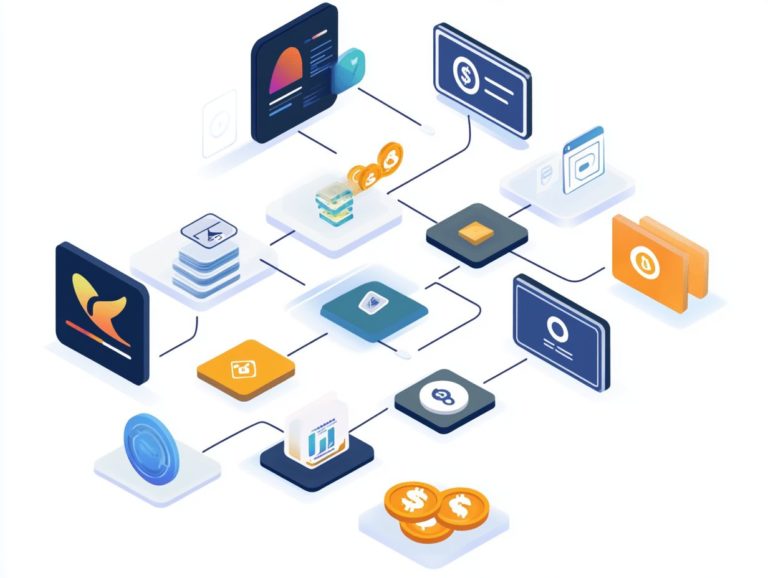The Ultimate Guide to Affiliate Tracking Tools
In the ever-evolving landscape of digital marketing, mastering affiliate tracking tools is crucial for your success. These tools enable you to monitor performance, enhance partnerships, and ultimately boost your revenue.
This article delves into what affiliate tracking tools are and explores their numerous benefits. You ll discover the different types available, including cookie-based and pixel-based tracking.
Additionally, it provides a comprehensive guide on selecting the right tool for your needs and implementing it effectively. Best practices are also shared to help you maximize your results.
Get ready to supercharge your affiliate marketing strategy today!
Contents
- Key Takeaways:
- Understanding Affiliate Tracking Tools
- Benefits of Using Affiliate Tracking Tools
- Types of Affiliate Tracking Tools
- Choosing the Right Affiliate Tracking Tool
- Setting Up and Implementing Affiliate Tracking
- Maximizing Results with Affiliate Tracking
- Frequently Asked Questions
- What are affiliate tracking tools?
- Why do I need affiliate tracking tools?
- What are some popular affiliate tracking tools?
- How do I choose the right affiliate tracking tool for my business?
- Are there any free affiliate tracking tools available?
- Do I need any technical knowledge to use affiliate tracking tools?
Key Takeaways:
- Affiliate tracking tools are essential for efficient management and reporting of affiliate marketing campaigns.
- There are two main types of affiliate tracking tools: cookie-based and pixel-based, each with its own unique benefits.
- Choosing the right affiliate tracking tool and implementing it correctly can greatly improve the success and results of your affiliate marketing efforts.
Understanding Affiliate Tracking Tools
Understanding affiliate tracking tools is essential for businesses that leverage affiliate marketing to optimize online referrals and enhance overall sales tracking. Utilizing the top e-commerce tools for affiliate marketers provides invaluable insights into your marketing strategies by monitoring key metrics such as conversion rates and commission attribution.
You can assess your affiliate partners’ effectiveness easily. In today s landscape, where data privacy regulations like the California Consumer Privacy Act and the General Data Protection Regulation are becoming increasingly stringent, it’s vital to ensure that your tracking processes comply with legal requirements while enhancing the user experience.
Balancing these priorities will enable you to maximize your affiliate marketing potential while maintaining trust with your audience.
What are Affiliate Tracking Tools?
Affiliate tracking tools are specialized software solutions designed to monitor and analyze the performance of affiliate marketing programs, allowing you to effectively track online referrals.
These tools offer essential functionalities, such as tracking links, which enable you to generate unique URLs for your affiliates. This ensures that every click is monitored with precision. Cookie tracking helps follow user activity by placing a small file on their device, allowing you to see where conversions come from. It attributes sales and conversions back to specific affiliates seamlessly.
Unique codes further personalize and streamline the tracking process, guaranteeing that commissions are calculated and distributed accurately. With these capabilities, you can optimize your affiliate strategies, boost engagement, and enhance your return on investment in the competitive realm of online marketing.
Benefits of Using Affiliate Tracking Tools
The advantages of utilizing affiliate tracking tools in affiliate marketing are substantial. You gain enhanced sales tracking, allowing for precise insights into your performance. Improved affiliate management becomes seamless, enabling you to foster stronger relationships with your affiliates.
Effective performance measurement helps you optimize conversion rates, ensuring every opportunity is maximized for success.
Efficient Tracking and Reporting
Efficient tracking and reporting are essential features of affiliate tracking tools that enable you to monitor sales performance and conversion rates with precision. These mechanisms allow you to gather critical insights into user interactions and the effectiveness of your campaigns.
By leveraging advanced strategies like cookie tracking, you can accurately pinpoint the sources of conversions and gain a detailed understanding of customer journeys. Server-to-server tracking (S2S) offers a robust framework for transmitting data directly between servers, ensuring reliable data capture while minimizing the risk of information loss.
Together, these methods enable you to make data-driven decisions, optimize your strategies, target the right audiences, and ultimately enhance the return on investment (ROI) of your campaigns.
Improved Affiliate Management
Improved affiliate management is a significant advantage of using affiliate tracking tools. These tools enable you to effectively oversee your affiliate partners and accurately attribute commissions.
This streamlined process cultivates stronger relationships with your affiliates and provides invaluable insights into performance data. By utilizing tracking methods like click-through rates and conversion tracking, you can identify which strategies are driving results.
This data-rich environment helps you develop more effective marketing approaches. As a result, you can optimize your campaigns, ensuring both you and your affiliates are aligned in pursuit of shared goals, ultimately leading to increased revenue and mutual growth.
Types of Affiliate Tracking Tools
You have various affiliate tracking tools at your disposal, each using distinct methods to monitor your affiliate marketing performance.
These include cookie tracking and pixel-based tracking, providing comprehensive insights into your campaigns.
Wondering which tracking method is best for you? Let s explore.
Cookie-based Tracking
Cookie-based tracking is a common method in affiliate tracking software. It uses first-party and third-party cookies to monitor user behavior and referral sources.
This tracking technique enables you to gather extensive data on how users engage with your site after clicking an affiliate link. Understanding which channels drive conversions can significantly enhance your campaign s performance.
Be aware that this method has limitations, such as privacy concerns and increasing cookie restrictions imposed by browsers. However, when used thoughtfully, cookie-based tracking can provide crucial insights that refine your targeting efforts and improve your ROI in affiliate marketing.
Pixel-based Tracking
Pixel-based tracking uses tracking pixels to monitor user actions. It is crucial for accurate performance measurement and conversion tracking in affiliate marketing.
This technology employs tiny, often invisible images embedded in web pages or emails. This allows you to gather essential data on how effectively your campaigns drive user interactions.
Implementing this system gives you deeper insights into customer behavior, enabling you to refine your tactics and reach the right audience more effectively. Accurate performance measurement not only enhances the effectiveness of your campaigns but also maximizes your return on investment, making pixel-based tracking an essential tool in the digital marketing landscape.
Choosing the Right Affiliate Tracking Tool
Selecting the right affiliate tracking tool is essential for success in affiliate marketing. You must consider several factors, including user experience, tracking capabilities, and API integration options.
Each element plays a vital role in ensuring your affiliate efforts are effective and streamlined for optimal performance.
Factors to Consider
When you re selecting affiliate tracking software, there are several key factors to consider, including user experience, data privacy, and fraud prevention features.
These elements are vital for ensuring that your affiliate marketing framework operates seamlessly. A user-friendly interface can streamline the process. This enhancement boosts overall engagement and productivity.
Robust data privacy measures are essential. They safeguard sensitive information and foster trust among all parties involved. Strong fraud prevention features are critical, as they deter malicious activities that may compromise performance metrics and campaign integrity.
Grasping the intricate balance of these factors can ultimately determine the effectiveness and success of your affiliate tracking efforts.
Setting Up and Implementing Affiliate Tracking
Setting up and implementing affiliate tracking software demands a careful method, one that involves a clear way to keep track of everything. By following a step-by-step method, you can significantly enhance the user experience while ensuring effective monitoring throughout the entire operation.
Step-by-Step Guide
A comprehensive guide to setting up affiliate tracking software enables you to leverage tracking links with precision, employing techniques such as manual tracking and cookie tracking (a method that follows user actions on your website). For deeper insights, consider understanding the role of affiliate marketing tools.
By breaking down the setup process into clear, manageable steps, you can effortlessly navigate the complexities of generating unique tracking links.
- First, it s crucial to choose the right affiliate tracking software that aligns with your specific marketing needs.
- Once you ve installed the software, you ll create tracking links through its user-friendly interface, allowing you to customize parameters like campaign names and sources.
- By implementing tracking methods, such as cookies, you can accurately monitor user interactions. This ensures that you re positioned to analyze performance effectively and refine your strategies as needed.
Maximizing Results with Affiliate Tracking
Boost your results with affiliate tracking by prioritizing best practices that elevate your marketing strategies. This focus not only enhances your performance measurement but also enables your business to achieve its goals with precision and effectiveness.
Best Practices and Strategies
Implementing best practices and strategies in affiliate tracking can elevate your collaboration with affiliate partners, enhance conversion rates, and effectively mitigate risks associated with fraud prevention.
Focus on performance measurement to unlock new levels of success! You can establish transparent communication channels that facilitate real-time data sharing and create valuable feedback loops. Leveraging advanced tracking technologies, such as multi-touch attribution (a method that tracks how multiple interactions lead to a sale) and cookie-less tracking, allows you to gain deeper insights into consumer behavior.
Build strong partnerships by choosing affiliates who share your brand values and providing them with tailored incentives based on their performance metrics. Regularly analyzing key performance indicators enables you to adjust strategies swiftly, ensuring that your resources are allocated efficiently for maximum ROI.
Frequently Asked Questions
What are affiliate tracking tools?
Affiliate tracking tools are software programs or platforms that help businesses track and manage their affiliate marketing programs. These tools provide valuable insights and analytics into the performance of affiliate campaigns, allowing businesses to make data-driven decisions to improve their strategies.
Why do I need affiliate tracking tools?
Affiliate tracking tools are essential for businesses to effectively manage their affiliate marketing programs. To find out more about the best affiliate marketing tools, these resources provide valuable data and analytics to help businesses make informed decisions, track conversions and commissions, and optimize their campaigns for maximum profitability.
What are some popular affiliate tracking tools?
Popular options include Google Analytics, AffiliateWP, Post Affiliate Pro, and Voluum. Each tool has unique features, so take time to find the one that fits your needs best.
How do I choose the right affiliate tracking tool for my business?
Consider pricing, features, ease of use, and how well it works with your website. Reading reviews can help you compare options and find the perfect fit.
Are there any free affiliate tracking tools available?
Yes! You can use free tools like Google Analytics and AffiliateWP Lite. They offer basic features that are great for businesses on a budget.
Do I need any technical knowledge to use affiliate tracking tools?
Most tools are user-friendly and easy to set up. Some knowledge may help with connecting tracking codes, but many tools offer customer support for assistance.


